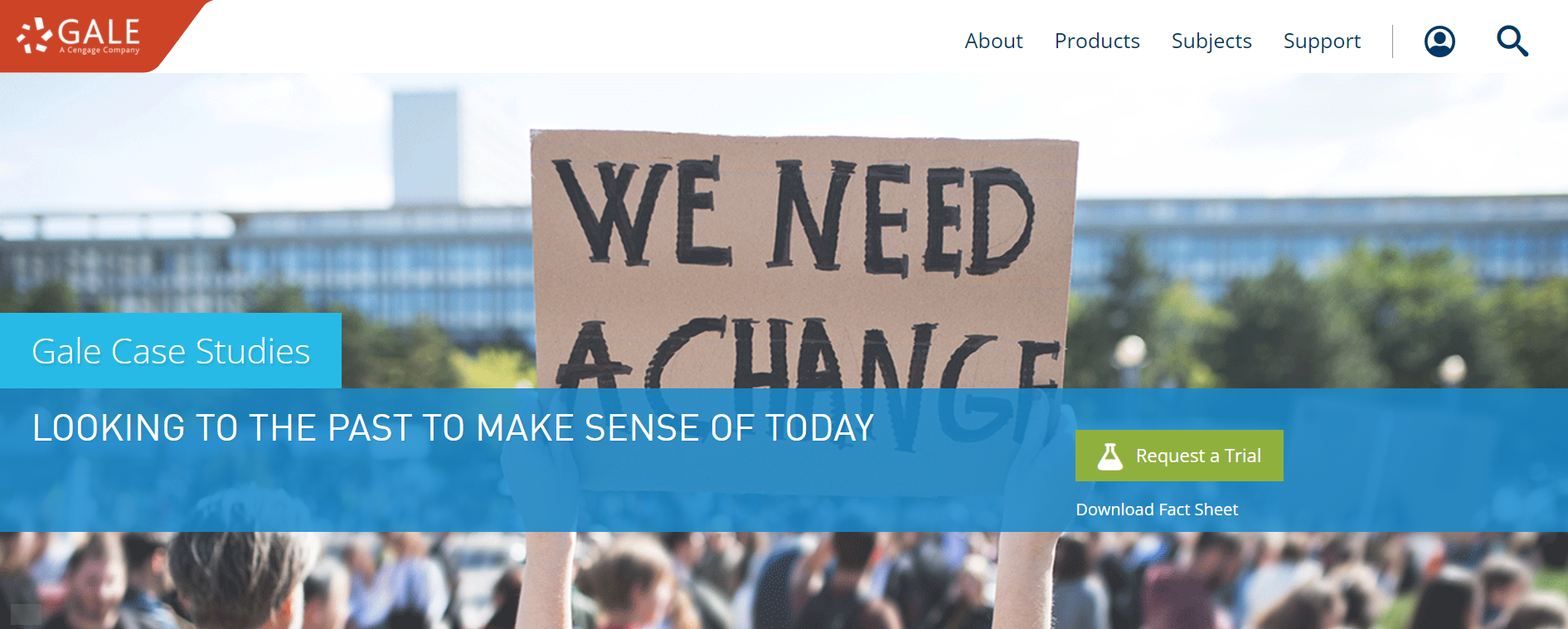Gale Case Studies | Reference eReviews
Gale Case Studies complies a number of case studies in each of the three modules which encompass multidisciplinary subjects. The topics covered (LGBTQ+ issues, political extremism, and public health) intersect with a wide variety of studies. Straightforward with helpful functions to create citations and facilitate discussions, this resource is ideal for undergraduates, although it could appeal to the general researcher as well.
 Gale Case Studies
Gale Case Studies
CONTENT
Gale Case Studies consists of three interdisciplinary subject modules: “Intersectional LGBTQ Issues,” “Political Extremism,” and “Public Health Issues.” Each module contains 10 to 12 case studies, each with background on the topic, up to eight primary sources, and four or five discussion questions. A wide range of primary documents is available, such as announcements, articles, brochures, correspondence, editorials, essays, reports, and more. “Intersectional LGBTQ Issues” examines the history of LGBTQ+ activism in the U.S. and Britain, both nationally and locally, from the 1950s to the 21st century. Users will find information on the National Gay and Lesbian Task Force Anti-Violence Project, FBI surveillance of LGBTQ+ organizations, and laws criminalizing cross-dressing. “Political Extremism” examines radical[1]ism in the United States, the United Kingdom, Spain, and Australia, covering the Ku Klux Klan, the Aryan Nations, the Weather Underground, and the Black Panther Party. “Public Health Issues” delves into the history of U.S. public health campaigns and programs from the early 1900s to the present, with a particular focus on public policy’s impacts on immigrants and marginalized people.
USABILITY
A no-frills, easy-to-use homepage welcomes users with a large basic search box, an advanced search option, and “about,” “browse cases,” and “search history” links. The three modules are featured front and center, with prominent photo[1]graphic tiles of individual case studies. Users can quickly find case studies by selecting either the browse cases tag or by clicking on an individual case tile. They can also conduct advanced or basic searches. Advanced searches can be limited by content type, publication date, document type, language, subcollection title, publication title, or source library. Subcollection type and publication title are particularly helpful filters; clicking them provides detailed lists of documents in the archive. Clicking “allow variations” enables retrieval of imperfect matches. A “topic finder” tool on the advanced search page creates colorful visualizations out of titles, subjects, and the first 100 words of a search. Response time is excellent, with multiple viewing and adjustment options. Documents can be downloaded, printed, emailed, or shared. Citations can be exported in APA, Chicago, Harvard, or MLA styles.
PRICING
Gale Case Studies modules are available to academic and public libraries as a one-time purchase model for perpetual access; cost is based on institution type, including Carnegie Classification, FTE, and program strength. It is not for purchase by individuals. Academic library pricing is based on a number of factors, including institution size, library materials budget, and Carnegie Classification and Humanities program levels. There is also a small annual hosting fee. Institutions holding two or more Gale Primary Source collections receive complimentary access to the Gale Primary Sources cross-search platform, which allows users to discover connections between other archival collections published by Gale. Potential customers should contact their Gale representative for up-to-date pricing and information on consortial purchases. A free trial of the product can be requested at gale.com/case-studies/trial-request.
VERDICT
This excellent resource ties together historical perspectives with modern themes. It’s a solid resource for English, history, gender studies, law, psychology, and sociology departments at the undergraduate level and for general research. The “Race & Civil Rights,” “Women’s Issues,” and “Refugees & Migration” modules, due for release in the next few months, will significantly enhance content of this database and expand its usefulness for research and classroom discussion.
RELATED
ALREADY A SUBSCRIBER? LOG IN
We are currently offering this content for free. Sign up now to activate your personal profile, where you can save articles for future viewing









Add Comment :-
Comment Policy:
Comment should not be empty !!!